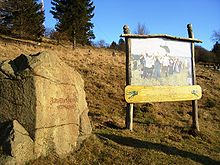German academic freelance
The German Academic Freischar was an association of reformed student associations that influenced the early youth movement .
history
The Academic Freischar zu Göttingen was founded in 1907 by the medical student Knud Ahlborn and his hiking friend Hans Harbeck in Göttingen. Both came from the Hamburg hiking club and so the first considerations were to name the new student association Academic Hiking Club. In the end, however, it was decided to use the militant part of the name Freischar , after all, in the founding document of February 19, 1907, they described themselves as "Combat League for the Reform of German Studentism". Academic groups were soon founded in other places of study, based on the troops of the liberation wars of 1813. These saw themselves as an alternative to the existing student associations . In 1908 the various Freischaren merged to form the Association of Academic Freischarians , from which the German Academic Freischarians ultimately emerged . Together with Deutsches Studenten, the federal government published a monthly for "modern studentism" at short notice. As a reformed student union, women were also able to become members of the Freischar. In addition, the so-called "irregulars" rejected the drinking and dueling that is otherwise common in student circles. The German Academic Freischar co-founded the Freideutschen Jugend as well as the initiator and co-host of the First Freideutschen Jugendtag on the Hohe Meissner in October 1913.
In the festschrift for the centenary on the Hohe Meißner, an ideal of the federal government is described as follows:
"All Freischar events have health and beauty as their supreme law."
In the same place it is written about the orientation of the association:
“Of course, the Freischar exert no conscience on its members. In particular, it does not prescribe any particular religious or political beliefs. It grants the individual full right to freedom of expression. "
The German Academic Freischar continued its federal life after the First World War .
Known members
- Knud Ahlborn - doctor
- Karl Bittel - historian and journalist
- Elisabeth Blochmann - pedagogue
- Max Bondy - founder of the school communities Gandersheim and Marienau
- Walter Christaller - geographer and founder of the theory of central places
- August Wilhelm Fehling - curator of the University of Kiel
- Gerhard Lütkens - diplomat and politician
- Carl Rothe - man of letters and cultural functionary
- Christian Schneehagen - co-organizer of the First Free German Youth Day
- Kurt Vermehren - lawyer
- Erich Less - educator
literature
- Sigrid Bias-Engels: Between Wandering Bird and Science - On the History of the Youth Movement and Student Body 1896–1920. Edition archive of the German youth movement. Vol. 4. Verlag Wissenschaft und Politik, Cologne 1988. ISBN 3-8046-8709-1
- Hiltraud Casper-Hehne: On the language of the Bundischen youth. Using the example of the German Freischar. Tübingen: Max Niemeyer 1989 (German Linguistic Series; 91) ISBN 3-484-31091-X Zugl .: Braunschweig, Techn. Univ., Diss., 1986
- Winfried Mogge, Jürgen Reulecke: Hoher Meißner 1913 - The First Free German Youth Day in Documents, Interpretations and Pictures. Edition archive of the German youth movement. Vol. 5. Verlag Wissenschaft und Politik, Cologne 1988. ISBN 3-8046-8723-7
